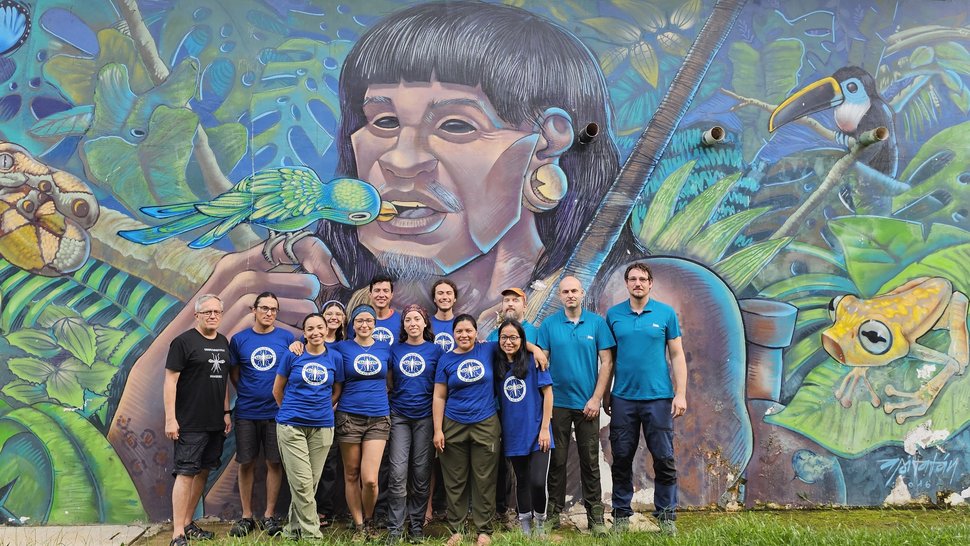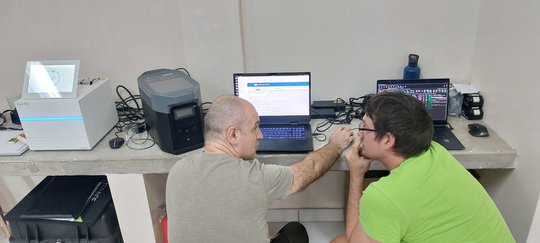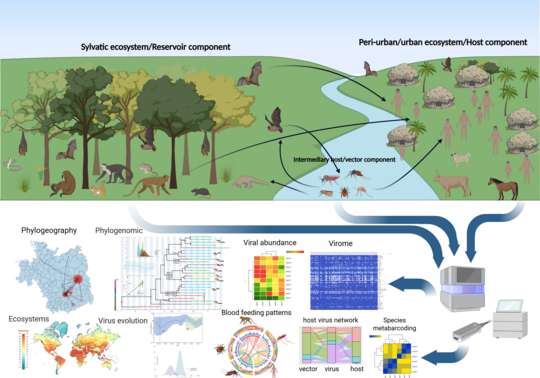New working group ‘Virus Metagenomics and Evolution’
How do environmental changes favour the emergence of new viral diseases?
How do you discover previously unknown viruses? What role do environmental changes play in the spread of zoonotic pathogens - i.e. those that can jump from animals to humans? A new working group at the Bernhard Nocht Institute for Tropical Medicine (BNITM) is addressing these questions with a comprehensive One Health approach. The scientists are investigating the role of landscape change, climate change and biodiversity loss in the evolution and spread of viral pathogens.

Viruses are omnipresent - and yet largely unexplored. Most circulate unrecognised in wild animals or insects and remain under the radar until they cause disease in humans. Human intervention in nature, for example through deforestation, urbanisation or intensive agriculture, creates new interfaces between animals, humans and the environment - and thus new risks for infectious diseases.
Interdisciplinary methods for virus discovery
In order to track down these hidden pathogens, the new ‘Virus Metagenomics and Evolution’ group uses so-called metagenomic and metatranscriptomic methods. The entire genetic material from environmental and host samples is analysed in order to systematically record the diversity of viral genomes - the so-called virome. The focus is on wild animals, farm animals, humans and so-called sentinel species, i.e. species that react sensitively to environmental changes and can provide early indications. The aim is to identify previously unknown viruses, track their development and assess the risk of spillover from animals to humans under real environmental conditions.


Recognising spillover risks at an early stage
A particular research focus is on the question of which ecological or molecular factors enable viruses to cross the species barrier. To this end, the scientists are developing prediction models that link the genetic characteristics of viruses with ecological risk factors. These should help to recognise potentially dangerous pathogens at an early stage and initiate countermeasures before outbreaks occur.
‘We want to systematically record the virome across different host species and ecosystems,’ says research group leader Dr Dániel Cadar. ‘Our aim is to gain a better understanding of how new viral diseases develop; for example, what role evolutionary strategies such as adaptation mechanisms or potential host changes play.’ From this, the researchers hope to deduce how future epidemics or pandemics can be prevented.

About the Bernhard Nocht Institute for Tropical Medicine (BNITM)
The Bernhard Nocht Institute for Tropical Medicine (BNITM) is Germany's largest institution for research, care, and teaching in the field of tropical and emerging infectious diseases. BNITM's research priorities have always been viewed from the perspective of Global Health/One Health and from the perspective of translation – the transfer of basic research into practical applications. This research approach is also reflected in the institute's five departments: Pathogen (pathogen) -> Interface (immunology, host/pathogen) -> Patient (clinical) -> Population (epidemiology) -> Implementation (successful establishment of knowledge).
Current thematic focuses include malaria, hemorrhagic fever viruses, neglected tropical diseases (NTDs), immunology, epidemiology and the clinical presentation of tropical infections, as well as the mechanisms of virus transmission by mosquitoes. The institute has laboratories with the highest biological safety level (BSL4) and a safety insectarium (BSL3) for handling highly pathogenic viruses and infected insects. The BNITM's mobile laboratories are available for global outbreak control of highly pathogenic or highly infectious viruses.
The BNITM is a National Reference Center for the detection of all tropical infectious agents, a consulting laboratory for Bornaviruses, a WHO Collaborating Center for Arboviruses and Hemorrhagic Fever Viruses, a WHO Collaborating Center for Behavioral Science for Global Health, and an institute within the Leibniz Association.
Together with the Ghanaian Ministry of Health and the University of Kumasi, the BNITM operates a modern research and training center in the West African rainforest, which is also available to external research groups. The institute also maintains numerous other collaborations in Africa, Asia, and Latin America.
Contact person
Dr Dániel Cadar
Research Group Leader
Phone : +49 40 285380-840
Fax : +49 40 285380-400
Email : cadar@bnitm.de
Julia Rauner
Public Relations
Phone : +49 40 285380-264
Email : presse@bnitm.de
Further information






